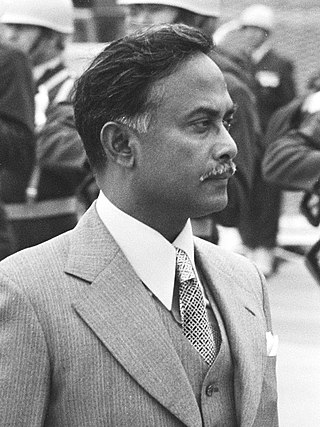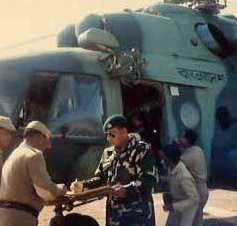
The Bangladesh Armed Forces are the military forces of the People's Republic of Bangladesh. They consist of the three uniformed military services: the Bangladesh Army, the Bangladesh Navy and the Bangladesh Air Force. The Armed Forces are under the jurisdiction of Ministry of Defence of the Government of Bangladesh, and are directly administered by the Armed Forces Division of the Prime Minister's Office. The President of Bangladesh serves as the Commander-in-Chief of the Bangladesh Armed Forces. Bangladesh has the third-largest defence budget in South Asia and according to the Global Firepower index, The Bangladeshi ilitary is the 37th strongest in the Worldit is the third most powerful military force in South Asia. Border Guard Bangladesh and Bangladesh Coast Guard are under the jurisdiction of the Ministry of Home Affairs during peacetime, but during wartime they fall under the command of Bangladesh Army and Bangladesh Navy respectively.

Ziaur Rahman was a Bangladeshi military officer and politician who served as the President of Bangladesh from 1977 until his assassination. He was the founder of the Bangladesh Nationalist Party (BNP) and served as its chairman until his assassination. He previously served as the second chief of army staff from 1975 to 1978 with a minor break.

Operation Searchlight was a military operation carried out by the Pakistan Army in an effort to curb the Bengali nationalist movement in former East Pakistan in March 1971. Pakistan retrospectively justified the operation on the basis of anti-Bihari violence carried out en masse by the Bengalis earlier that month. Ordered by the central government in West Pakistan, the original plans envisioned taking control of all of East Pakistan's major cities on 26 March, and then eliminating all Bengali opposition, whether political or military, within the following month.

The Bangladesh Army is the land warfare branch and the largest component of the Bangladesh Armed Forces. The primary mission of the Army is to provide necessary forces and capabilities to deliver the Bangladeshi government's security and defence strategies and defending the nation's territorial integrity against external attack. Control of personnel and operations is administered by the Army Headquarters, Dhaka. The Bangladesh Army is also constitutionally obligated to assist the government and it's civilian agencies during times of domestic national emergency. This additional role is commonly referred to as "aid to civil administration".

Bangladesh has undergone several changes of government since the Proclamation of Independence in 1971. Between the first recorded uprising in August 1975 and the last known attempt in December 2011, Bangladesh has been through as many as 29 military coups.
Abdur Rahman Biswas was a Bangladeshi politician. He was the President of Bangladesh from 1991 to 1996. Biswas represented Pakistan at the United Nations General Assembly prior to the independence of Bangladesh.

Ziaur Rahman, the sixth president of Bangladesh, was assassinated by a faction of officers of Bangladesh Army, on 30 May 1981, in the south-eastern port city of Chittagong. Rahman went to Chittagong to arbitrate in a clash between the local leaders of his political party, the Bangladesh Nationalist Party. On the night of 30 May, a group of officers commandeered the Chittagong Circuit House, a government residence where Rahman was staying, shooting him and several others.
Muhammed Abul ManzurBU was a Bangladeshi military officer who commanded the Bangladesh Forces operations in Sector 8 during the Bangladesh Liberation War against Pakistan in 1971. He was allegedly involved in the assassination of the then-president of Bangladesh, Ziaur Rahman. The erstwhile chief of army staff and alleged mastermind of Rahman's assassination, Hussain Muhammad Ershad, had put a standing shoot-to-kill order on Manzur's life—he was killed shortly after being captured at the border. About a year later, Ershad initiated a bloodless coup d'état and took over the central government, holding power until 1990.
Shafaat Jamil, Bir Bikrom was a Bangladesh Army colonel. He was the commanding officer of the 3rd East Bengal Regiment of Z Force Brigade in Sector 11 of Bangladesh Forces during the War of Bangladesh Independence in 1971. He was among the first Bengali officers who rebelled against the Pakistani Army in the 1971 Liberation War of Bangladesh and later fought in 11 sector and in Sylhet sector.
On 25 March 1971, the Pakistani military, supported by paramilitary units, launched the military operation to pacify the insurgent-held areas of East Pakistan, which led to a prolonged conflict with the Bengali Mukti Bahini. Although conventional in nature during March–May 1971, it soon turned into a guerrilla insurgency from June of that year. Indian Army had not directly supported the Bengali resistance but had launched Operation Jackpot to support the insurgency from May 1971.
The Eastern Command of the Pakistan Army also known as III Corps was a corps-sized military formation headed by a lieutenant-general, who was designated the Commander 3 Corps. After the partition of India by United Kingdom, the Islamic Republic of Pakistan was divided into two territories separated by 1,000 miles (1,600 km). Most of the assets of the Pakistan armed forces were stationed in West Pakistan; the role of the Pakistan armed forces in East Pakistan was to hold that part of the country until the Pakistani forces defeated India in the west. The Pakistan Army created the Eastern Command, with one commander in the rank of Lieutenant General responsible for the command. The armed forces, had drawn up a plan to defend Dhaka by concentrating all their forces along the Dhaka Bowl.

Prior to Bangladesh Liberation War in 1971, India had no plans for large scale military action in East Pakistan. Since the Sino-Indian War of 1962, the primary objective of the Indian Army Eastern Command was the defence of the Indian northern and eastern borders, defending the "Shiliguri Corridor", and on combating insurgencies raging in Mizoram, Nagaland, Manipur and the Naxalites in West Bengal.
Chowdhury Hasan Sarwardy, Bir Bikram, SBP, BSP, OSP, ndc, psc is a retired lieutenant general of Bangladesh Army and former commandant of National Defence College. He previously served as GOC of Army Training and Doctrine Command (ARTDOC).

Lieutenant Colonel Syed Mir Ali Imam Al Mamun is a retired Officer of Bangladesh Army and the head of the aristocratic Padamdi family of Rajbari, present day Bangladesh.
Mustafizur Rahman was a Bangladeshi Army general who served as the Chief of Army Staff of the Bangladesh Army from December 1997 until 23 December 2000.
The 1996 Bangladesh coup d'état attempt was a coup attempt in Bangladesh. The coup was launched by Army Chief of Staff Abu Saleh Mohammad Nasim against the President of Bangladesh Abdur Rahman Biswas. The coup failed and the Army chief of Staff was dismissed.
Department of Military Lands and Cantonments is the Government department responsible for the land management of cantonments in Bangladesh. Shamim Ahmed is the current Director General of Department of Military Lands and Cantonments.
Golam Helal Morshed Khan is a retired Major General of the Bangladesh Army and veteran of the Bangladesh Liberation War. He was awarded Bir Bikrom, third highest gallantry award, for his actions in the war. He participated in the 1996 Bangladeshi coup d'état attempt.

The 11th Infantry Division is a formation of the Bangladesh Army based in Bogra Cantonment.








